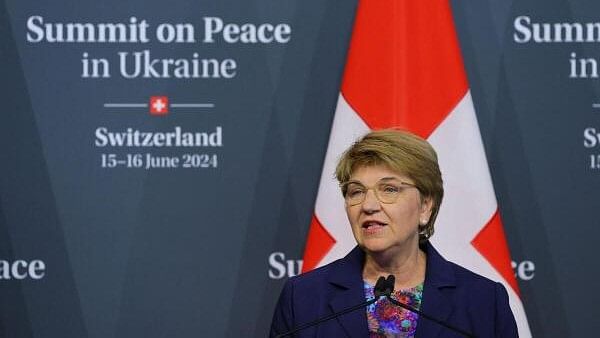
Swiss President Viola Amherd speaks during the closing press conference of the Summit on Peace in Ukraine, in Stansstad near Lucerne, Switzerland, June 16, 2024.
Reuters
New Delhi: India sent a senior diplomat to represent it at a peace summit held in Switzerland to end the Russia-Ukraine conflict over the weekend, but refrained from associating itself with a joint communiqué, which 80 nations issued at the end of the conclave.
New Delhi argued that both Ukraine and Russia should be on the table for any peace initiative to succeed.
The joint communiqué issued by 79 nations at the end of the summit underlined that Ukraine’s territorial integrity must be the basis of any peace agreement with Russia. India, however, joined several other attendees, including Saudi Arabia, South Africa, Thailand, Indonesia, Mexico, and the United Arab Emirates, to dissociate from the joint communiqué. Brazil, which attended the summit as an ‘observer’, also did not sign on the joint communiqué.
“In our view, only those options acceptable to both parties can lead to abiding peace. In line with this approach, we have decided to avoid association with a joint communique or any other document emerging from this summit,” Pavan Kapoor, Secretary (West) at the Ministry of External Affairs, said at the conclave held at a resort near Lucerne in Switzerland.
Russia and its key ally China did not attend the peace summit, which was seen as a move by the West to drum up support for the 10-point peace formula proposed by Ukraine.
“Our participation in the summit and continued engagement with all stakeholders is with a view to understanding different perspectives, approaches, and options to find a way forward for a sustainable resolution of the conflict,” said Kapoor, who led the delegation from New Delhi at the summit in Switzerland.
New Delhi refrained from associating itself with the joint communiqué just days after Prime Minister Narendra Modi had a bilateral meeting with Ukrainian President Volodymyr Zelenskyy on the sideline of the 50th G7 summit at Apulia in Italy on Friday. This was the second meeting between the two leaders after Russia launched its special military operations in Ukraine in February 2022. They had earlier met on the sideline of the previous G7 summit at Hiroshima in Japan last year.
Zelenskyy had in the past repeatedly requested Modi during phone calls to send a high-level delegation to the peace summit.
It was at the G20 summit at Bali in Indonesia in November 2022 that Ukrainian President Volodymyr Zelensky first presented a 10-point peace plan to end Russia's military operations in his country.
The 10-point plan included the restoration of the territorial integrity of Ukraine and a complete withdrawal of troops by Russia as well as prosecution of people responsible for war crimes. Moscow rejected the peace formula offered by Kyiv.
New Delhi drew flak from the United States and the rest of the West for not joining the clamour against Moscow after Russia launched its “special military operations” in Ukraine in February 2022. New Delhi has been maintaining a strategic balance in its ties with Moscow and Washington DC. India’s decades-old strategic partnership with and its dependence on the Soviet Union and its successor Russia for military hardware appeared to have stopped New Delhi from speaking up against Moscow.
India has been circumventing sanctions imposed by the US and the rest of the West on Russia and continued bilateral trade. It has also increased oil and coal imports from Russia. Modi, however, told Russian President Vladimir Putin in Samarkand in September 2022 that it was not an era of war, and the Moscow-Kyiv conflict should be resolved through dialogue and diplomacy.
